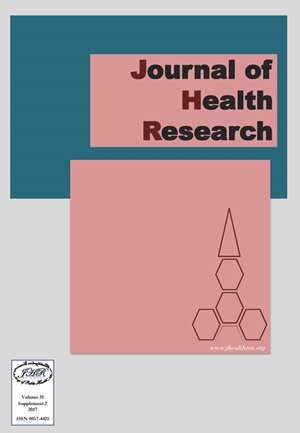Premenstrual Syndrome and Sleep Quality among Private Hospital Nurses in Bangkok, Thailand
Keywords:
Sleep quality, Premenstrual syndrome, Nurses, Private hospitalAbstract
Background: Premenstrual syndrome is a recurrent disorder in the luteal phase of the menstrual cycle. The common sleep problems associated with premenstrual syndrome are insomnia, night time awakenings, and non-restoration of sleep. A nurse is a profession that tends to have more circadian rhythms disturbance because of shift working patterns. This study aimed to explore whether premenstrual syndrome associated with sleep quality among private hospital nurses in Bangkok, Thailand.
Method: A cross-sectional study design was used in this study. The participants of 209 female nurses who classified as a regular menstruation in one private hospital were recruited. The self-reported standard questionnaire was distributed to the participants. Sleep quality and premenstrual syndrome was accessed by Pittsburgh Sleep Quality Index (PSQI) – Thai version and Premenstrual Symptoms Screening Tool (PSST) – Thai version respectively. The associations of factors and sleep quality were analyzed by Chi-square test. Binary logistic regression was used to identify the adjusted odd ratio of PMS on poor sleep quality.
Results: The mean age of registered nurses were 31.38 (±5.35) years. Most of them were single (78.9%) and had normal stress level (82.9%). More than half of the nurses (66.5%) had been working on rotating shift included night shift. Prevalence of poor sleep quality (PSQI > 5) was found in 66.5% of nurses. Small group of nurses (7.7%) had premenstrual syndrome. Physical symptoms (48.30%) and overeating/ food craving symptom (41.60%) were the highest reported symptoms of premenstrual syndrome. There was no significant associated between premenstrual syndrome and poor sleep quality. Binary logistic regression showed almost symptoms of premenstrual syndrome were a risk to poor sleep quality (OR adjusted >1) even though statistical significance was not achieved.
Conclusion: More than half of private hospital nurses had poor sleep quality and small group of them had premenstrual syndrome. Premenstrual syndrome was not significant associated with poor sleep quality. The results suggested that a management of nurses’ working schedule should consider their physical activities during their luteal phase of the menstrual cycle.






